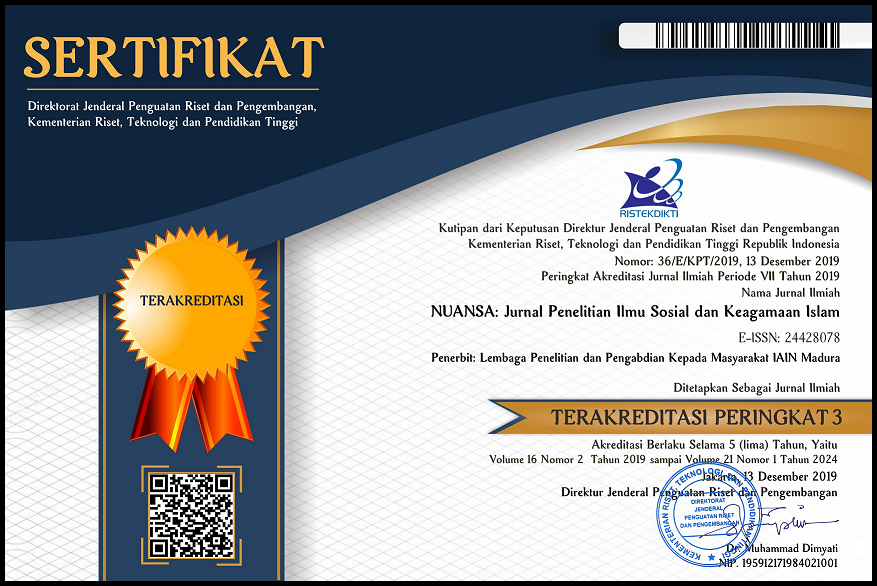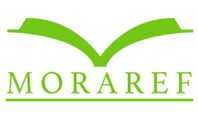Etika Madura: Suatu Analisa Filsafati tentang Penghayatan Harmonis dan Disharmonis Terhadap Worldview Orang Madura
 Abstract views: 1205
,
Abstract views: 1205
,
 PDF downloads: 533
PDF downloads: 533
Abstract
Etika Madura mencerminkan nilai-nilai manusiawi yang menjadi salah satu pedoman alternatif menghadapi tantangan modernisasi untuk memahami tingkah laku, kebijaksanaan, dan penghayatan hidup orang Madura. Persoalan kesatuan dunia sebagai sebuah keteraturan dan ketersusunan yang baik, secara implisit terungkap dalam pandangan dunia masyarakat Madura. Dunia, manusia, dan alam adikodrati bagi masyarakat Madura bukanlah tiga bidang yang relatif berdiri sendiri dan masing-masing mempunyai hukumnya, melainkan merupakan satu kesatuan pengalaman. Kesatuan pengalaman yang dimiliki, dihayati, dan dipraktekkan secara turun temurun oleh orang Madura. Rumusan masalah dalam penelitian ini, yaitu: pertama, Bagaimana worldview orang Madura dalam khasanah kearifan lokal Madura? Kedua, Bagaimana orientasi pengembangan etika Madura berbasis makna kearifan lokal dalam worldview orang Madura? Penelitian ini merupakan penelitian pustaka dengan menggunakan pendekatan (objek formal) etika. Bahan penelitian (objek material) adalah semua pemikiran, pemahaman, dan pemaknaan tentang worldview orang Madura yang telah ditulis oleh peneliti lain dengan menggunakan pendekatan yang berbeda. Analisa yang digunakan dalam penelitian ini adalah hermeneutika-filsafati dengan unsur metodis, yaitu deskripsi, komparasi, dan refleksi. Hasil penelitian menunjukkan bahwa pertama, Relasi tradisi budaya masyarakat Madura dalam struktur ontologis transendental bermakna sosio-kultursentrisme. Sosio-kultursentrisme merupakan kriteria ada tidaknya etika dalam diri orang Madura. Kedua, Relasi tradisi budaya masyarakat Madura secara hakiki sebagai prinsip pertama. Relasi merupakan titik pangkal dan titik akhir realitas dalam orientasi pengembangan etika dengan harmoni dan disharmoni sebagai norma ontologis transendental. Etika memandang Relasi sebagai tolok ukur untuk menilai kebenaran setiap pola pikir, sikap, dan perilaku dalam tradisi budaya masyarakat Madura.
(Ethics Madura reflect the Values of humanity who became one of the guidelines alternatives to face the challenges of modernization to understand the behavior, wisdom, and appreciation of life of people of Madura. The issue of world unity as a good order and composition is implicitly revealed in the world view of the Madurese people. In the world, humans, and the supernatural nature of Madurese is not three relatively independent fields and each has its own laws, but is a unity of experience. The unity of experience possessed, lived, and practiced from generation to generation by Madurese. The formulation of the problem in the study of this, namely: First, how worldview of people of Madura in the treasures of wisdom locally Madura? Second, how is the orientation of Madura based ethical development the meaning of local wisdom in the Madurese worldview? Research is a research library by using the approach ethics. Materials research are all thinking, comprehension, and interpretation of the worldview of people of Madura who was written by researchers other by using the approach that is different. Analysis were used in research this is the hermeneutical-philosophical with elements of methodical, ie description, comparison, and reflection. Results of the study show that First, relations Madurese community cultural traditions in transcendental-ontological-structure of meaningful socio-culture-centrally in mind. socio-culture-centrally in mind the criteria there is absence of ethics in themselves the Madurese. Second, the cultural relation of Madurese people is essentially the first principle. Relationship is the starting point and end point of reality in the orientation of ethical development with harmony and disharmony as transcendental-ontological-norms. Ethics views relations as a benchmark for assessing the truth of each mindset, attitude, and behavior in the cultural traditions of the Madurese people).
Downloads
References
Bagus, Lorens, Kamus Filsafat, Jakarta: Gramedia Pustaka utama, Cet. Ke-6, 2005
Bakker, Ontologi atau Metafisika Umum Filsafat Pengada dan Dasar-Dasar Kenyataan, Yogyakarta: Kanisius, 1992
______, Kosmologi dan Ekologi Filsafat Tentang Kosmos Sebagai Rumah Tangga Manusia, Yogyakarta: Kanisius, 1995
Bakker, Anton & Achmad Charris Zubair, Metodologi Penelitian Filsafat, Yogyakarta: Kanisius, 1990,
Burhan, Edi, et al., Inventarisasi Tradisi Ritus Pada Masyarakat Madura di Sumenep, Laporan Penelitian, Jember: Departemen Pendidikan dan Kebudayaan Universitas Jember, 1994
Effendi, Bisri, An-Nuqoyah: Gerak Transformasi Sosial Masyarakat Madura, Jakarta: P3M, 1993
Fahmy Zarkasyi, Hamid, Worldview Islam dan kapitalisme Barat, Jurnal Tsaqafah: Institut Studi Islam Darussalam, Volume 9, Nomor 1, April, 2013
Hasan, Nur, Kritik Islamic Worldview Syed Muhammad Naquib Al-Attas Terhadap Western Worldiew, Maraji’: Jurnal Studi Keislaman Vol 1, Nomor 1, September, 2014
Hidayat, Ainurrahman, Kearifan Lokal Masyarakat Madura, Yogyakarta: Pustaka Nusantara, 2010
Kaelan, Metode Penelitian Kualitatif Bidang Filsafat, Yogyakarta: Paradigma, 2005
Keraf, Sonny, Etika Lingkungan, Jakarta: Penerbit Buku Kompas, 2002
Mansurnoor, Iik Arifin, Islam in an Indonesian World, Ulama of Madura, Yogyakarta: Gadjah Mada University Press, 1990
Moleong, Lexy J., Metodologi Penelitian Kualitatif, Bandung: Remaja Rosdakarya, 1990
Poespoprodjo, W., Interpretasi, Bandung: Remadja Karya, 1987
Rifai, Mien Ahmad, Manusia Madura, pembawaan, perilaku, etos kerja, penampilan dan pandangan hidupnya seperti dicitrakan peribahasanya, Yogyakarta: Pilar Media, 2007
Sartini, Menggali Kearifan Lokal Nusantara Sebuah Kajian Filsafati, Jurnal Filsafat, Jilid 37, Nomor 2, Yogyakarta: Fakultas Filsafat UGM, 2004
Siswanto, Joko, Metafisika Substansi, Tesis, Yogyakarta: Fakultas Filsafat UGM, 1995
Sugiyono, Metode Penelitian Kuantitatif, Kualitatif dan R&D, Bandung: Alfabeta, 2006
Wiyata, A. Latief, Masyarakat Madura dan Interaksi Antar Etnik, dalam Aswab Mahasin dkk. [ed.], Ruh Islam dalam Budaya Bangsa: Aneka budaya di Jawa, Jakarta: Yayasan Festival Istiqlal, 1996
___________________, Carok: Konflik Kekerasan dan Harga Diri Orang Madura, Yogyakarta: LkiS, 2002
The journal operates an Open Access policy under a Creative Commons Attribution-NonCommercial 4.0 International License (CC-BY-NC) 
Authors who publish with this journal agree to the following terms:
- Authors retain copyright and grant the journal right of first publication with the work simultaneously licensed under a Creative Commons Attribution License that allows others to share the work with an acknowledgement of the work's authorship and initial publication in this journal.
- Authors are able to enter into separate, additional contractual arrangements for the non-exclusive distribution of the journal's published version of the work (e.g., post it to an institutional repository or publish it in a book), with an acknowledgement of its initial publication in this journal.
- Authors are permitted and encouraged to post their work online (e.g., in institutional repositories or on their website) prior to and during the submission process, as it can lead to productive exchanges, as well as earlier and greater citation of published work.





















